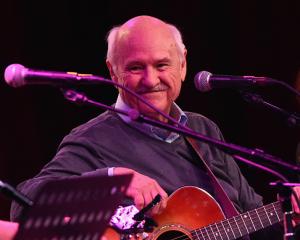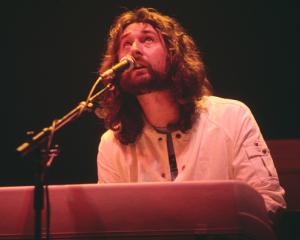A love of the baroque - its architecture, painting, literature and even furniture - led Frenchman Christophe Rousset to play the harpsichord. He tells Rebecca Fox how it evolved into Les Talens Lyriques.
Playing an original harpsichord has a ‘‘time machine'' effect, says Christophe Rousset.
‘‘Having an original one under your fingers with so many fingerprints preceding yours is mind-blowing indeed.''
Owning a French double harpsichord from 1704, an Italian one from 1724 and an Italian spinet from 1573 was very inspiring, he said.
‘‘But, contrary to a violinist, you can't really travel with them and the danger is always to find delusion in concert with much inferior harpsichord.''
He also had the honour of playing a Joannes Ruckers harpsichord from 1628 in the Chateau of Versailles, recording the second volume of Bach's The Well-Tempered Clavier on record label Aparte, which was awarded a ‘‘Choc'' from Classica magazine and CD of the week from Britain's Radio 3.
The instruments of the Paris Museum of Music have also been entrusted to him for recording music by Royer, Rameau and Froberger.
He has been awarded the French honours of Chevalier (knight) of the Legion d'Honneur (the highest French honour), Commandeur in the Ordre des Arts et des Lettres (for contribution to the arts) and Chevalier in the Ordre national du Merite.
‘‘I appreciate my works receives some echo.''
His discovery of the harpsichord had its origins in his attraction to baroque music.
Growing up in Aix en Provence, he began to study the piano.
‘‘When I first heard the fifth Brandenburg concerto in concert, I became totally enthusiastic and was convinced.''
The music that accompanied church services, salon amusements, ballet evenings and operas was music for every occasion, he said.
‘‘I love all these expressions. It was a time of high sophistication: you find it in harmony, in musical gestures, in orchestration, in coloratura, in a breathtaking chorus of a Bach passion.''
The difficulty of the harpsichord also attracted him, as well as its ‘‘abstract and austere repertoire''.
‘‘But mostly its crystalline sound.''
He went on to study the instrument at La Schola Cantorum in Paris and the Royal Conservatoire in The Hague, winning the prestigious first prize in the 7th Bruges Harpsichord Competition at age 22.
He appeared at some top early music festivals and recorded for the Decca record label and its early music title L'Oiseau-Lyre, winning a Gramophone Award for best baroque non-vocal piece for a recording of Rameau's Pieces de clavecin.
Rousset (54) went on to play in American harpsichordist and conductor William Christie's ensemble Les Arts Florissants.
He was only 23 when the late English harpsichordist and conductor Christopher Hogwood, of the Academy of Ancient Music, predicted he would become a conductor.
‘‘But I had no ambition then to become one.''
However, Christie asked him to become his musical assistant, which required him to prepare his choir and orchestra. That led to conducting some concerts.
When he was 30, he staged his first opera with Les Arts Florissants.
Moving to conducting from playing the harpsichord was ‘‘like changing from black and white to colour''.
‘‘But of course the palette of expression was suddenly so wide, I had to experiment for many years.''
He now knew what kind of sound he had in mind, according to every repertoire, he said.
‘‘I like leading a group of people, I like dealing with singers. I understand them and I always support them; as I myself have no voice, I feel I have to sing through their voices.''
He began to think it was time to create his own ensemble so he would be free to choose his own repertoire, performers and singers.
‘‘My intuitions always have been strong and I never doubted my interpretations.''
Les Talens Lyriques was born in 1991, deriving its name from the subtitle of one of Rameau's operas, Les Fetes d'Hebe (1739).
The ensemble promotes music from early baroque to early romanticism, performing works that are rarely performed or are unpublished ‘‘genuine missing links in European musical heritage''.
It has performed around the world at top concert houses including Opera de Paris, De Nederlandse Opera, Opera Royal de Versailles, the Barbican Centre (London), Carnegie Hall (New York) and the Aix-en-Provence and Beaune festivals.
Rousset, who is based in Paris and has a country house (‘‘to isolate myself sometimes'') in Tuscany, Italy, is bringing three members of Les Talens - Gilone Gaubert-Jacques (violin), Gabriel Grosbard (violin) and Atsushi Sakai (viola da gamba) - to Dunedin this month as part of Chamber Music New Zealand's Kaleidoscopes season.
It was his first visit to New Zealand, which was very exciting, he said.
‘‘I've been told I would drink the best French wines produced in New Zealand. Curious to taste.''
While keen to see some of the country's landscapes, he would not have much time for sightseeing.
‘‘I can't miss the Auckland Museum of Art. And someone told me that in Otago the concert hall has an acoustic comparable to Amsterdam's Concertgebouw; exciting.''
The group will perform a varied programme of suites, sonatas and character pieces reflecting the time of the court of France's Louis XIV, the Sun King.
It will also include the ‘‘Versailles Experience'', an opportunity to find out more about the music of Versailles in the time of the Sun King.
When not playing or conducting, he liked to teach. He conducted and organised master classes and academies for young people across Europe.
To learn the harpsichord took patience, good ears, a sense of challenge and enormous imagination, he said.
‘‘I teach because I like transmitting, I like to be confronted by young people, and as I said, my intuitions are very strong but it's also a challenge to communicate them, to express them in words.''
He and Les Talens also worked to introduce young secondary school pupils in Paris to the world of music.
The harpsichord
•A harpsichord is played by keyboard. It produces sound by plucking a string when a key is pressed.
•The earliest known reference to a harpsichord dates from 1397.
•The organ is far older than the harpsichord.
•The early instrument is far smaller than the fully evolved harpsichord.
•The harpsichord was largely obsolete, and seldom played, from the late 18th century to the early 20th century.
To see
Les Talens Lyriques: L'Esprit Francais, Glenroy Auditorium, April 11












